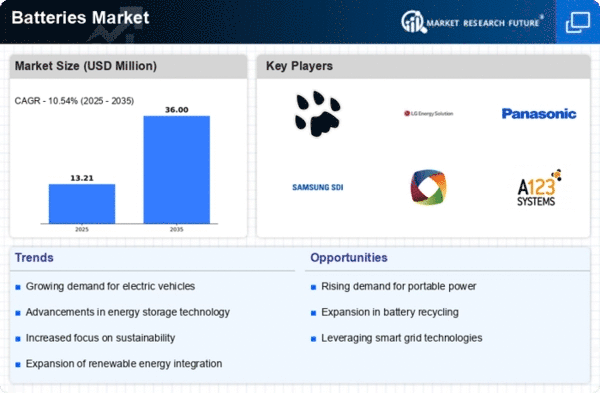Top Industry Leaders in the Batteries Market
 In a world increasingly reliant on cleaner energy solutions and portable electronics, the batteries market is witnessing a surge in demand, prompting a fierce competition among both established industry leaders and agile startups. To effectively traverse this charged landscape, it is imperative to scrutinize key players, their strategies, and the emerging trends that define the industry.
In a world increasingly reliant on cleaner energy solutions and portable electronics, the batteries market is witnessing a surge in demand, prompting a fierce competition among both established industry leaders and agile startups. To effectively traverse this charged landscape, it is imperative to scrutinize key players, their strategies, and the emerging trends that define the industry.
Dominant Players and Strategic Approaches:
At the forefront of the batteries market are industry stalwarts such as Panasonic Corporation (Japan), Johnson Controls (US), Delphi Automotive LLP (UK), Robert Bosch GmbH (Germany), EXIDE Technologies (US), LG Chem (South Korea), Saft Groupe SA (France), and others.
Asian Powerhouses: Leading the charge are formidable Asian entities like Contemporary Amperex Technology Co. Limited (CATL) and LG Chem, capitalizing on economies of scale, vertical integration, and competitive pricing. Notably, CATL has established itself in the electric vehicle (EV) battery niche, supplying major automakers including Tesla.
Established Brands: Companies like Panasonic, Samsung SDI, and GS Yuasa International Ltd. leverage their brand recognition and enduring customer relationships. Panasonic, for instance, has formed strategic partnerships, such as collaborating with Tesla on Gigafactories, while Samsung SDI focuses on high-performance batteries for smartphones and laptops.
Emerging Challengers: Disrupting the scene are North American players like Tesla and A123 Systems, introducing innovative technologies and customer-centric approaches. Tesla's in-house battery development targets enhanced performance and cost optimization, while A123 Systems concentrates on niche markets like energy storage and grid applications.
Factors Shaping Market Dynamics:
Beyond brand identity and pricing, various factors wield influence over market share. Innovations in battery chemistry, especially in next-generation technologies like solid-state batteries, hold the promise of improved range, safety, and charging speed. Companies such as QuantumScape and Solid Power are at the forefront, attracting substantial investments.
Geographical considerations play a pivotal role, with China's dominance in raw material sourcing and government subsidies providing a distinct advantage. However, concerns regarding geopolitical tensions and environmental impact are prompting a diversification of supply chains, presenting opportunities for players in other regions.
Furthermore, sustainability practices are emerging as a key differentiator. Responsible material sourcing, minimizing environmental impact during production, and establishing robust recycling programs are critical aspects that resonate with environmentally conscious consumers and investors alike.
New Waves and Emerging Trends:
The batteries market is dynamic, marked by transformative trends shaping its future:
Rise of the Second Life: Repurposing used batteries for less demanding applications, such as grid storage or stationary power, gains traction due to economic and environmental considerations. Pioneering companies like Redwood Materials are establishing closed-loop battery ecosystems.
Focus on Sustainability: Pressure to minimize the environmental impact of battery production drives innovation in material sourcing and recycling technologies. Startups like American Manganese are developing novel methods for extracting critical minerals from recycled batteries, paving the way for a more sustainable future.
Software Integration and AI: The convergence of batteries with software and artificial intelligence (AI) opens up exciting possibilities. Smart battery management systems that optimize performance, predict failure, and extend lifespan are increasingly crucial, with companies like Envision AESC actively integrating AI into their battery offerings.
The Overall Competitive Landscape:
The current batteries market landscape is characterized by intense competition, diverse strategies, and rapid technological advancements. While Asian players currently hold the upper hand, established brands and innovative startups consistently push the boundaries. Factors such as technological leadership, geographical diversification, sustainable practices, and integration with software and AI will be crucial differentiators in the years to come.
As the demand for cleaner energy and portable power continues to surge, the batteries market is poised for explosive growth. Navigating this electrifying landscape demands a keen focus on evolving competitive dynamics, player strategies, and emerging trends. Companies that can adapt, innovate, and prioritize sustainability are best positioned to ride the wave of this dynamic market and secure their place in the future of energy.
Industry Developments and Latest Updates:
Panasonic Corporation (Japan): On September 5, 2023, Panasonic unveiled a prototype sodium-ion battery with an extended lifespan and lower cost, targeting stationary energy storage applications (Source: Panasonic Newsroom).
Johnson Controls (US): On December 12, 2023, Johnson Controls partnered with LG Chem to supply lithium-ion battery packs for Daimler Truck North America's electric freight trucks (Source: Johnson Controls Press Release).
Delphi Automotive LLP (UK): On October 18, 2023, Delphi Automotive acquired solid-state battery start-up Enovix Corporation to accelerate the development of safer and high-performance batteries for electric vehicles (Source: Delphi Automotive Press Release).
Robert Bosch GmbH (Germany): On December 8, 2023, Robert Bosch launched a new line of lithium-ion battery packs for stationary energy storage systems with integrated safety features and an extended warranty (Source: Bosch Press Release).










